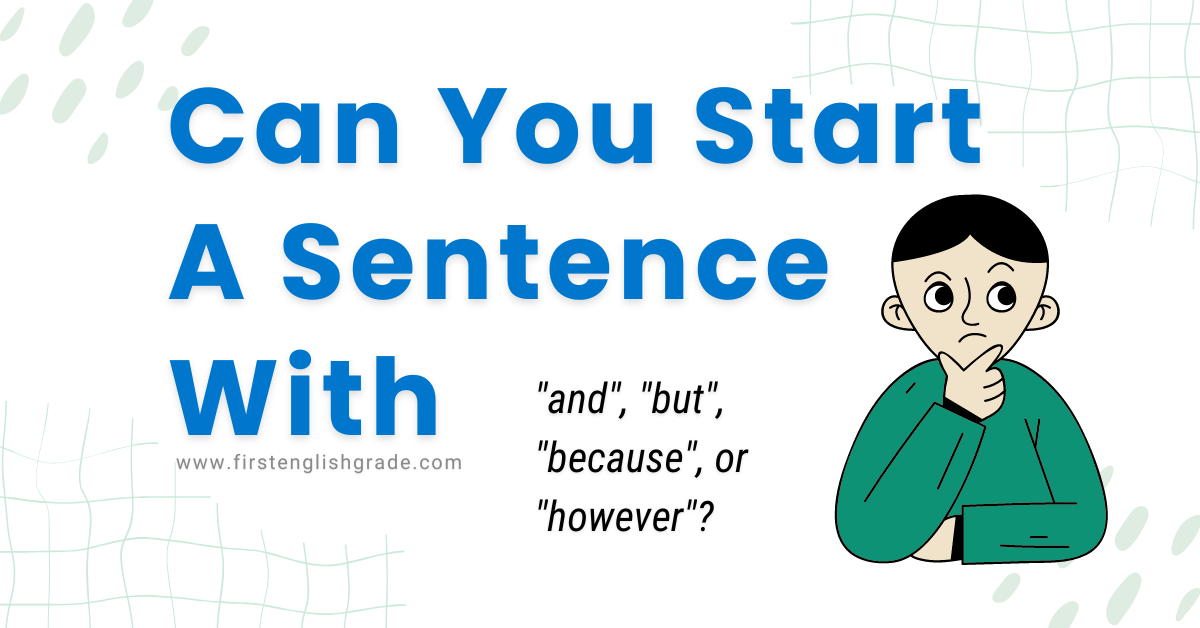Grammar is a fascinating and complex subject that can sometimes be confusing or intimidating. But don’t worry, we are here to help you with some of the most frequently asked grammar questions. In this article, we will focus on one of the most debated topics in grammar: Can you start a sentence with certain words or conjunctions, such as “and”, “but”, “because”, or “however”?
Starting a Sentence with And
The coordinating conjunction “and” is traditionally used to connect words, phrases, or clauses. Many people think that starting a sentence with “and” is grammatically incorrect, but that is not true.
No rule forbids using “and” at the beginning of a sentence. For instance, you can start a sentence with “and” to create a sense of continuity or connection between sentences or paragraphs. “He completed his workout at the gym. And then, he went for a jog in the park.“
However, it is not very common in formal or academic writing, and it may make your sentences sound less polished or professional. Therefore, you should use it sparingly and only when it makes sense for the flow or meaning of your text.
Starting a Sentence with But
You can start a sentence with the word “but”. Like “and”, “but” is a coordinating conjunction that can link two or more words, phrases, or clauses of equal grammatical rank. However, unlike “and”, “but” is used to show contrast or opposition between the connected elements. Therefore, starting a sentence with “but” can create a strong sense of contrast or surprise for the reader or listener.
This can be effective in some situations, such as: To emphasize or highlight a point that is different from or contrary to a previous statement. For example, “He said he was sorry. But he didn’t mean it.”
Starting a Sentence with Or
You can start a sentence with “or” as a conjunction to introduce a new argument or idea from the previous sentence. Starting a sentence with “or” can add variety to your writing style. However, you should be careful not to create sentence fragments that lack a verb, subject, or complete thought.
For example, you can write: “We could visit the Thai place or the Indian place. Or, we can go to the new Mexican restaurant in the town square.” But you should not write: “Or the new Mexican restaurant in the town square.”
You should also use a comma after “or” when it starts a sentence, and a period before it if the previous sentence is too long or wordy.
Starting a Sentence with So
Starting a sentence with the word “so” is a common practice in the English language. There is no strict grammatical rule that prohibits using “so” at the beginning of a sentence.
We often use “so” as a discourse marker or a filler word to connect ideas or to signal a continuation of thought. For example, “So, what do you think about the new project?” Here, “so” is used to get someone’s attention or to give the speaker time to think about what to say next.
It’s worth noting that starting a sentence with “so” can sometimes be seen as informal or conversational. Therefore, it’s essential to consider the context and the audience when using “so” at the beginning of a sentence.
Starting a Sentence with Yet
“Yet” is a conjunction indicating contrast. When starting a sentence with yet, it’s important to ensure that the sentence is still grammatically complete and makes sense on its own. For example, the following sentence is grammatically correct:
“I didn’t think I would like this movie. Yet, I ended up enjoying it quite a bit.”
In this case, “yet” connects two independent clauses, each of which could stand alone as a complete sentence.
However, if you use “yet” to start a sentence, and the sentence is not grammatically complete or doesn’t make sense, then the sentence may be considered a sentence fragment. For example:
“I didn’t think I would like this movie. Yet, enjoyed it quite a bit.”
In this case, the second sentence lacks a subject. The verb “enjoyed” is present, but there’s no clear subject performing the action. Since the second sentence is incomplete, it becomes a sentence fragment.
Starting a Sentence with Nor
“Nor” is a coordinating conjunction used to link two negative ideas together in a single sentence. For example, “I don’t like spinach, nor do I like broccoli.” Here, “nor” is used to connect two negative ideas (“I don’t like spinach” and “I don’t like broccoli”) and create a compound sentence.
However, it is also perfectly acceptable to use “nor” to start a new sentence, especially when the second sentence is a continuation of the first sentence’s negative idea. For instance:
“I don’t like spinach. Nor will I eat it, no matter how many times you ask.”
In this example, “Nor will I eat it, no matter how many times you ask” is a new sentence, but it continues the negative idea established in the first sentence.
It’s worth noting that starting a sentence with “nor” is less common than starting a sentence with “and” or “but,” and some style guides recommend avoiding it if possible.
Starting a Sentence with BECAUSE
Starting a sentence with “because” can be effective for emphasis. “Because” is a subordinating conjunction, meaning it introduces a dependent clause that cannot stand alone as a complete sentence. For example: “Because the weather was terrible, we decided to stay indoors.” In this example, the sentence beginning with “because” is dependent on the rest of the sentence for complete meaning.
While it’s acceptable to use “because” at the beginning of a sentence, it’s important to note that doing so can lead to sentence fragments. To avoid sentence fragments, ensure that the sentence following “because” provides a complete thought and has both a subject and a verb.
Example of a potential fragment: “Because the weather was terrible.” This construction lacks a complete idea and would benefit from merging with another sentence or adding necessary components.
Starting a Sentence with Although
You can start a sentence with although. However, it is important to use the word “although” correctly and in the right context.
“Although” is a subordinating conjunction, which means it connects a dependent clause to an independent clause. For example, in the sentence “Although Emma wasn’t very good at painting, she loved to do it,” the word “although” connects the dependent clause “Although she wasn’t very good at painting” to the independent clause “she loved to do it.” It shows a contrast between Emma’s lack of skill and her enjoyment of the activity.
Starting a Sentence with “If”
“If” is a subordinating conjunction used to express a condition. Starting a sentence with “if” is common in both formal and informal writing. Starting a sentence with “if” can be a powerful way to introduce a hypothetical or conditional situation.
For example, consider the sentence “If it rains tomorrow, we will stay indoors.” Here, the word “if” is used to introduce a hypothetical situation (i.e., it might rain tomorrow), and the rest of the sentence describes the consequence of that situation (i.e., we will stay indoors).
Starting a sentence with “if” can also be a useful way to express a condition or requirement. For instance, consider the sentence “If you want to enter the park, you need to show your ticket.” In this case, the word “if” is used to introduce a condition (i.e., showing your ticket) that must be met for something to happen (i.e., entering the park).
Starting a Sentence with “When”
“When” is a subordinating conjunction denoting time or condition. Starting a sentence with “when” is a common writing practice, and it’s not grammatically incorrect. Using “when” at the beginning of a sentence can add emphasis and create a more conversational tone. However, it’s important to use it correctly to avoid creating a sentence fragment.
To use “when” correctly at the beginning of a sentence, you must ensure that the dependent clause it introduces is followed by an independent clause. For example: “When I arrived at the party, everyone was already there.” In this example, the dependent clause “When I arrived at the party” is followed by an independent clause “Everyone was already there.” This creates a complete sentence.
On the other hand, if you use “when” at the beginning of a sentence without an independent clause, you create a sentence fragment. For example: “When I arrived at the party.” (Incomplete sentence)
Starting a Sentence with a Number
Starting a sentence with a number is generally avoided, but there are exceptions. You can start a sentence with a number if they are part of a proper noun or specific technical context. For example: “7th Street is located downtown.”
However, it’s generally recommended to spell out numbers at the beginning of a sentence if they are not part of a proper noun or specific technical context. This helps improve readability and style in formal writing.
For example:
Incorrect: 5 apples fell from the tree.
Correct: Five apples fell from the tree.
Starting a Sentence with “Therefore”
“Therefore” is a conjunctive adverb that denotes a conclusion or result. Starting a sentence with “therefore” is grammatically correct and can contribute to the logical flow of your writing. When using “therefore” at the beginning of a sentence, it’s important to make sure that the sentence is linked to the previous information.
Here’s an example of how “therefore” can be used effectively at the beginning of a sentence:
“We have been experiencing a high volume of calls today. Therefore, we may experience some delays in answering your call.”
In this example, “therefore” links the second sentence to the first, indicating that the delays in answering calls are a result of the high volume of calls being received.




